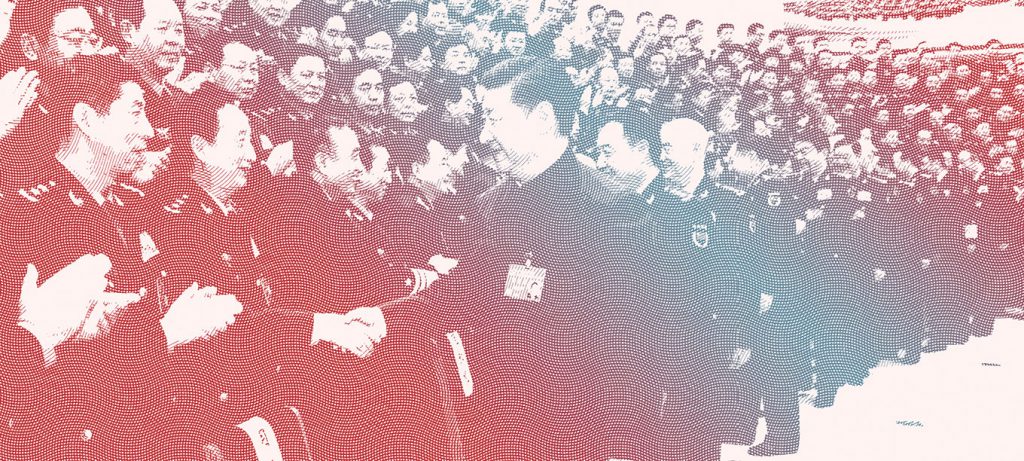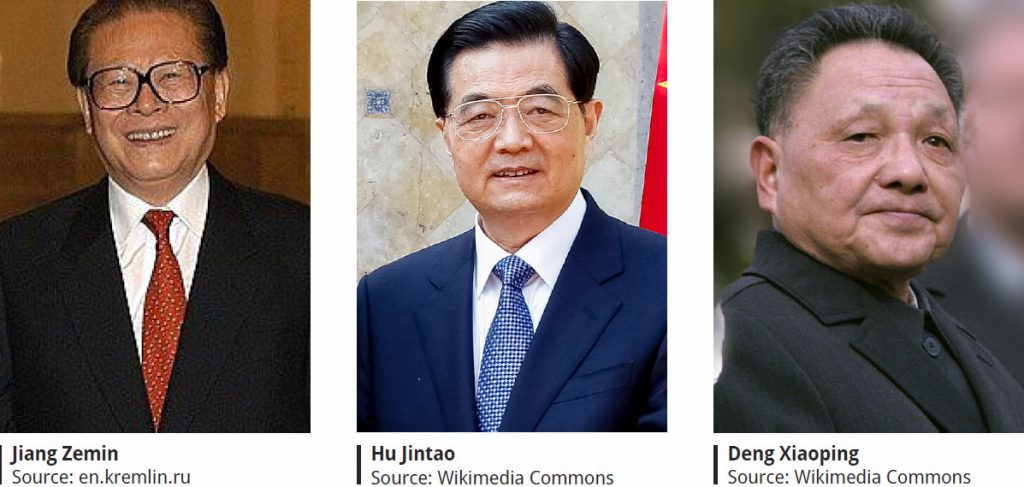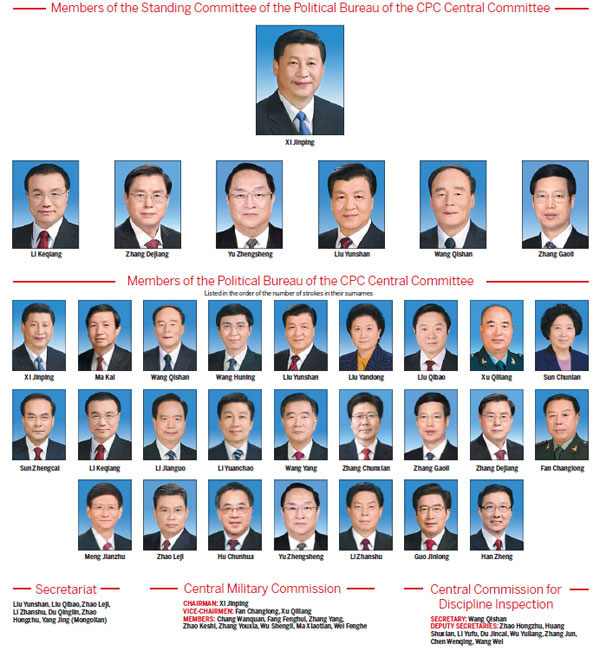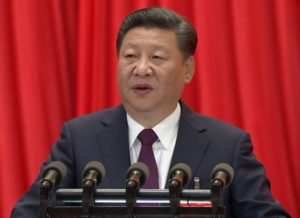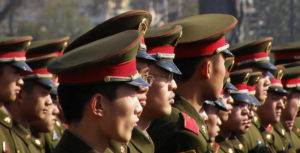THE NINETEENTH Communist Party Congress in October put the coping stone on Xi Jinping’s ascendancy over the Chinese Communist Party (CCP), and ensured the Party’s continuing central role in China’s political, social, and economic life. Xi’s key message to the Congress was that China had finally emerged as a global power. But the Party will continue to face growing social, environmental, and economic challenges. How well it meets them will depend on Xi’s capacity to exercise the supreme power he has been given.
The authoritarian Xi Jinping dominates and controls the Party, which, through the Congress, awarded him greater power than his two predecessors, Jiang Zemin 江泽民 and Hu Jintao 胡锦涛, and a status on par with Deng Xiaoping 邓小平, who led China’s post-Mao transition into the era of economic reform. The Congress amended the Party constitution to add ‘Xi Jinping Thought for the New Era of Socialism with Chinese Characteristics’习近平新时代中国特色社会主义思想 as the guiding ideology for the ‘New Era’. Its central message, in fourteen ‘fundamental principles’, is restoring China to the greatness that it lost during the ‘hundred years of humiliation’ that began with the Opium Wars (1839–1860) and the further depredations of Western and Japanese imperialism. The means for achieving greatness is a rejuvenated CCP, cleansed of corruption, and dedicated to its leadership of China and the advancement of China’s national interests.
Xi is the first leader since Mao Zedong to have an official ideology named after him. Added to his designation in September 2016 as the ‘central core’ of the Party, it so comprehensively identifies Xi with the Party that any criticism of him from within the Party could be considered treason against the Party itself. It is possible to detect shades of the Maoist past in the treatment of rivals and enemies. Liu Shiyu 刘士余, chairman of the China Securities Regulatory Committee, for example, has praised Xi for ‘saving the Communist Party’ from an alleged anti-Party plot. Liu named Sun Zhengcai 孙政才, former Chongqing Party Secretary and a recent rival of Xi Jinping who was arrested and expelled from the Party several months before the Congress, as part of this anti-Party plot, linking him with former Party and military heavyweights Bo Xilai 薄熙来, Zhou Yongkang 周永康, Ling Jihua 令计划, Xu Caihou 徐才厚, and Guo Boxiong 郭伯雄. All of these men, who had enjoyed ‘high positions and great power in the party, but [who] were hugely corrupt and plotted to usurp the party’s leadership and seize state power’, are currently in prison.
The Congress endorsed an almost complete change in the members of the Politburo Standing Committee (the Party’s — and therefore China’s — supreme governing body) with only Li Keqiang 李克强, who was appointed to a second term as premier, and Xi Jinping himself as holdovers from the outgoing Standing Committee. Of the five new members, three are clearly aligned with Xi: Li Zhanshu 栗战书, Director of the CCP General Office and a long-time friend and aide to Xi who was responsible for pushing the idea of Xi as the ‘leadership core’; Wang Huning 王沪宁, Director of the CCP Policy Research Office, an academic turned party ideologist who is believed to have helped to craft Xi Jinping’s speeches, reports and even the ‘China Dream’; and Zhao Leji 赵乐际, who succeeds Wang Qishan 王岐山 in the politically sensitive role heading up China’s anti-corruption watchdog, the Central Commission for Discipline Inspection (CCDI). The remaining two, Wang Yang 汪洋 and Han Zheng 韩正, belong at least nominally to the two other informal factions: Wang, former party chief in Guangdong, to Li Keqiang’s Communist Youth League faction; and Han, former mayor and party boss of Shanghai, to Jiang Zemin’s Shanghai faction. These appointments maintain a nominal but diminished factional balance within the Standing Committee, with both the Communist Youth League faction and the Shanghai faction suffering a clear loss of political clout. Han Zheng, moreover, has moved closer to Xi Jinping in recent years and, as the new executive vice-premier, it is believed that he will keep an eye on Li Keqiang for Xi.
Xi is entering his second five-year term as Party chairman. It has previously been customary for the Party Congress that confirms the second term to reveal the chairman’s designated successor. The most striking feature of the new leadership line-up is that there is no designated successor among them. All of them are essentially administrators. This has aroused the suspicion of many foreign commentators that Xi Jinping intends to ignore the customary two terms for the senior leader and go for a third in 2022. But this could encourage a backlash from other ambitious leaders who are waiting for their turn.
On the other hand, it might also be that Xi is biding his time, waiting to see how the members of the Standing Committee and the full Politburo perform. Of the fifteen new members appointed to the twenty-five member Politburo, two-thirds either worked for or have had long-standing connections to Xi Jinping. Two, in particular, deserve a mention: Chen Min’er 陈敏尔, the new Chongqing party secretary, who many foreign academic and media observers (wrongly) tipped for promotion to the Standing Committee; and Liu He 刘鹤, the Director of the Central Committee’s Leading Group on Financial and Economic Affairs, who has advised Xi on economic issues, and who played a key role in drafting the economic reform blueprint endorsed by the Eighteenth Central Committee’s Third Plenum. It might well be from the ranks of people like these that Xi eventually draws his successor.
Xi Jinping’s speech to the Congress underscored his determination to strengthen the leadership of the country by the Party. Guided by Xi Jinping Thought, which senior academics at the Party School have declared to be ‘Marxism for the twenty-first century’, the Party will continue to expand its control over economic enterprises — state-owned, private, and joint ventures with foreign companies — through Party cells embedded in these organisations. At the same time, the Party will strengthen ideological instruction in China’s schools and universities, in order to encourage Chinese youth to commit to the Party’s values. This will be accompanied by a continuing, perhaps intensified crackdown on all forms of dissent, and a narrowing of the scope for intellectual discussion and debate. The appalling fate of leading intellectual dissident and Nobel Peace Prize winner, Liu Xiaobo 刘晓波, who died in custody only a few months before the Congress, sends a chilling warning to all intellectuals to conform to the Party orthodoxy or remain silent.
At the same time, Xi Jinping seeks to improve the quality of the Party’s eighty-nine million members and their commitment to the values of the Party-state. He will continue with his coercive but popular anti-corruption campaign, implemented by the CCDI. The creation of supervisory commissions at all levels of Party government — national, provincial, city, and county — will strengthen and extend the supervisory functions of the CCDI . This bolstering of the CCDI’s functions will ensure that it remains an essential instrument through which Xi Jinping controls the Party.
A Better Life for the New Era
In his speech to the Congress, which lasted 205 minutes, Xi Jinping indicated that he intends to have a fundamental shaping influence on China’s future. He spoke of China since 1949 having gone through two thirty-year periods, first that of Mao Zedong, which founded and consolidated an independent new China (the People’s Republic), and that of Deng Xiao-
ping, which laid the basis for contemporary China’s prosperity through economic reform and opening up to the outside world, lifting 700 million people out of poverty. Xi set out his vision for a third era to be guided by his ‘Thought’ in which he will restore China’s greatness, drawing on both socialist and nationalist aspirations. This will be a two-stage process beginning in 2020, with the aim of achieving by 2050 ‘a great modern socialist country that is prosperous, strong, democratic, culturally advanced, harmonious and beautiful’. Xi sees himself defining this ‘New Era’ in the same way that Mao and Deng defined the two earlier periods. They now explicitly make up a triumvirate of key leaders of the People’s Republic.
Xi stressed that the Party must address the Chinese people’s rising economic and environmental aspirations for a ‘better life’ 美好生活. It is clear that Xi sees this as the major domestic political task facing the Party, and the one on which its future credibility will depend: the principal economic and social contradiction facing China, he told the Congress, was ‘between unbalanced and inadequate development and the people’s ever-growing needs for a better life’. While listing among his achievements raising over sixty million people out of poverty and creating thirteen million urban jobs since 2012, he also insisted that much still needs to be done. Poverty alleviation remained ‘a formidable task’, and he acknowledged the large (and increasing) disparities in income and development between urban and rural areas and between regions, as well as problems with meeting the Chinese people’s needs for employment, education, healthcare, housing, and aged care. Xi’s Beautiful China Initiative 美丽中国, which acknowledges the Chinese people’s concern for their environment, meanwhile, addresses environmental issues, including water security and pollution, both of which have become serious political concerns as well. All of these urgent social problems pose major challenges for Xi’s second term.
To successfully tackle its social and environmental problems, China needs to maintain a GDP growth rate of 6.7–6.8 per cent, and Xi indicated that the aim is for continued, moderately high growth over the next few years. He pointed to the strength of China’s economy during his first term, when GDP rose from US$8.2 trillion to US$12.1 trillion. He also drew attention to the fact that China’s economy had become the second largest in the world, contributing thirty per cent to global economic growth (a figure confirmed by Forbes magazine) and, in a triumphalist flourish, noted that ‘China now leads the world in trade, outbound investment, and foreign exchange reserves’.
For all its dynamism, the Chinese economy is bedevilled by serious structural problems, the most significant being the growing debt-to-GDP ratio. According to the New York Federal Reserve, since 2005 China has accounted for fifty per cent of all new credit created globally — a huge burden for an economy that accounts for fifteen per cent of the global economy. And China’s growth continues to be funded by injections of credit from domestic sources. This ongoing expansion of China’s debt-to-GDP ratio poses some longer term risks to the economy, and is beginning to concern international financial institutions: in May 2017, the rating agency Moody’s downgraded China’s credit rating for the first time in nearly thirty years. Straight after the Party Congress, Zhou Xiaochuan 周小川, the governor of the People’s Bank of China, warned that Chinese corporate debt was so high it threatened financial stability, and called for fiscal reforms to constrain local government borrowing.
Enter the Dragon: A Mighty China
In his speech, Xi asserted that by the middle of the twenty-first century China will have ‘emerged as a global leader in terms of comprehensive national power and international influence’. He underlined the commitment to economic globalisation and the multilateral trading system that he first made at Davos in January 2017, as well as China’s continuing adherence to the Paris climate accord. His emphasis on global governance reflects a desire to capitalise on the uncertainty produced by the nativist and anti-globalisation policies of the Trump Administration as well as a belief that the United States itself has been in long-term decline ever since the Global Financial Crisis of 2008.
As in his earlier speeches regarding the Belt and Road Initiative (discussed in Chapter 2), Xi put forward China as a developmental model that ‘offers Chinese wisdom and a Chinese approach to solving the problems facing mankind, and that other countries can emulate’. At the BRICS (Brazil, Russia, India, China, and South Africa) summit in Xiamen in September, immediately before the Congress, Xi Jinping extended an invitation to five other developing economies (Egypt, Mexico, Thailand, Tajikistan, and Guinea) to partner with BRICS. This explicitly challenges the Western developmental model and is also part of a larger implicit challenge to the Western liberal democratic order, underwritten by the US, that has underpinned the international order since 1945.
Xi adopted a similarly muscular tone with regard to the South China Sea, Hong Kong, and Taiwan. Of course, China’s earlier rejection of the United Nations Permanent Court of Arbitration’s ruling on the South China Sea dispute does not bode well for China’s global citizenship in areas where international law conflicts with its perceived national interests. Xi did not mention North-East Asia or the North Korea nuclear weapons crisis. This is currently the biggest threat to Chinese and world security. Any direct confrontation between the US and North Korea would inevitably involve China.
Another topic of the epic speech was the modernisation of the People’s Liberation Army (PLA), which Xi said would be ‘basically completed’ by 2035; by the middle of the twenty-first century, the PLA ‘will be transformed into a world-class military’. This will be the finishing touch on wide-ranging military reforms that Xi began in 2012. These involved the recentralisation of decision-making in the Central Military Commission (CMC), which he heads, administrative reorganisation, the downsizing of the PLA, and the retirement of over fifty senior military leaders, including two formerly powerful CMC vice-chairmen. All of this has strengthened the Party’s, but particularly Xi Jinping’s control over the PLA as CMC chairman. In his speech, Xi reiterated the ‘absolute’ nature of the Party’s leadership over the military. The purpose of modernising the PLA is not only to defend China’s national security interests but also to be able to contest US military power in East Asia in the future.
Xi Ascendant
In sum, the Nineteenth Party Congress affirmed Xi Jinping’s ascendancy, essentially letting him take control over China’s political system, Party, and military. Xi’s ability to surmount various political challenges in the run-up to the Congress and the shape of the new leadership line-up reveal how astute and formidable a politician he is. His landmark speech sketched out ambitious long-term social, economic, and environmental goals, while proposing China’s development model as an alternative to that of the West. The Congress is a turning point for China, highlighting its international ambitions, including Xi’s clear determination to wrest leadership in global governance from the US, and a more assertive and robust foreign policy. The global balance of power is shifting and, as Xi’s speech made plain, China is rapidly emerging as a centre of global economic and strategic power.
Notes
For the full English version of President Xi’s speech on 18 October 2017, see online at: http://www.xinhuanet.com/english/special/2017-11/03/c_136725942.htm. For the Chinese version, see http://www.xinhuanet.com/politics/19cpcnc/2017-10/27/c_1121867529.htm.


